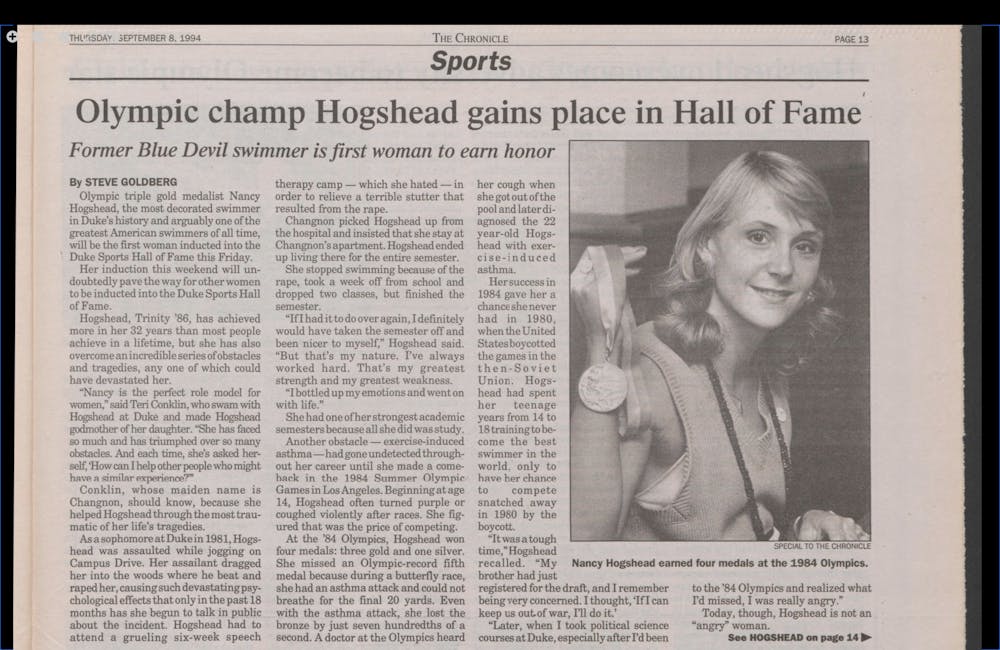In honor of Duke’s Centennial, The Chronicle’s new Blast from the Past series highlights pivotal figures and events in Duke sports history. Next up, we take a look at the story and impact of former Blue Devil swimmer Nancy Hogshead-Makar:
Content warning: This article contains mentions of sexual assault.
It takes a tremendous athlete to win at the highest level. Perhaps even rarer than such a champion is a change-maker that advocates for the health and safety of others. Nancy Hogshead-Makar is not only the first woman to be inducted into the Duke Sports Hall of Fame, but she is also a vocal proponent of gender equality and sexual assault prevention in sports.
Born in Iowa City, Iowa before moving to Jacksonville, Fla., at 11-years-old, Hogshead-Makar qualified for the U.S. Swimming Senior Nationals before even turning 13. By the time she was 15, Hogshead Makar had already broken the national record for the 100-yard butterfly and was considered one of best swimmers in the country.
After training with the University of Florida swim team throughout high school, Hogshead-Makar qualified for the 1980 Summer Olympics in the 200-meter butterfly and 400-meter individual medley. However, she did not participate in the games due to the boycott protesting the Soviet Union’s invasion of Afghanistan.
Up until 1980, Duke had never awarded a swimming scholarship. In fact, at the time, it was rare for any school to offer a swimmer a fully-funded spot on its team. With Hogshead-Makar’s one-of-a-kind talent though, former head coach Bob Thompson decided to give her the Blue Devils’ first swimming scholarship before even receiving clearance to do so. This groundbreaking move paved the way for future female swimmers and transformed Duke’s swimming program.
Coming to Durham played a pivotal role in Hogshead-Makar’s life, both in and out of the pool. In her freshman year alone, the Iowa City native won four ACC titles in the 500-yard freestyle, 1650-yard freestyle, 200-yard butterfly, and 400-yard individual medley. Hogshead-Makar also achieved two All-American finishes at nationals and set school records in each of her events. However, after her unprecedented freshman year, tragedy struck.
On a jog between West and East Campus, Hogshead-Makar was suddenly dragged into the woods and raped. After the sexual assault, Hogshead-Makar considered ending her swimming career. To this day, she still credits the support from her teammates and Blue Devil staff for influencing her decision to return to the sport. Thompson encouraged the talented swimmer to take a year off from competitive play, promising her that she would still go on to win the Olympics. Sue Wasiolek, former associate vice president of student affairs introduced Hogshead-Makar to the Women’s Studies department at Duke, paving the way for her future activism.
Hogshead-Makar could never stay away from the water though. It was underwater where she felt the safest. In fact, Hogshead-Makar recalls how swimming gave her an outlet to release all the emotional energy she had been keeping inside. Eighteen months after that night in the woods, Hogshead-Makar stood on the podium of the 1984 Summer Olympics in California. At the Olympic Games, she championed the 100-meter freestyle, 4x100-meter freestyle relay, and the 4x100-meter medley. Hogshead-Makar went home, not only a 3-time Olympic champion, but also the most decorated swimmer of the entire games.
Following her Olympic success, Hogshead-Makar dedicated herself to making sports more equitable and accessible. After attending law school at Georgetown University, Hogshead-Makar founded a non-profit named Champion Women in 2014. The organization aims to provide legal advocacy for women in sports. Through Champion Women, Hogshead-Makar performs pro-bono work focused on ensuring women have the same opportunities in sports as men. Her organization notably works with the Title IX Project which holds high schools and universities accountable to Title IX, the policy which prohibits discrimination based on sex in schools.
Hogshead-Makar’s own experience with sexual assault also influenced her advocacy to make sports safer for athletes. In addition to its work with gender equality, Champion Women is also committed to ending sexual abuse in sports. In particular, Hogshead-Makar has focused her efforts on protecting athletes from predatory relationships. For example, she worked on the Safe Sport Authorization Act for six years before it was passed in 2018, a law that requires sports organizations to limit the one-on-one interactions between an adult and a minor athlete. With national governing bodies of sports like USA Gymnastics and USA Swimming reportedly covering up hundreds of sexual abuse cases over the past decade, Hogshead-Makar’s work is more important than ever.
As the most decorated swimmer in Blue Devil Athletics history, Nancy Hogshead-Makar no doubt made an impact during her time on campus. She opened the door for hundreds of future Duke swimmers and will always be remembered for her dominance in the pool. This makes her even greater impact as an advocate for sports equality and sexual assault prevention all the more impressive. Hogshead-Makar’s story demonstrates how athletic greatness provides opportunities to change the world for the better.
Get The Chronicle straight to your inbox
Sign up for our weekly newsletter. Cancel at any time.

